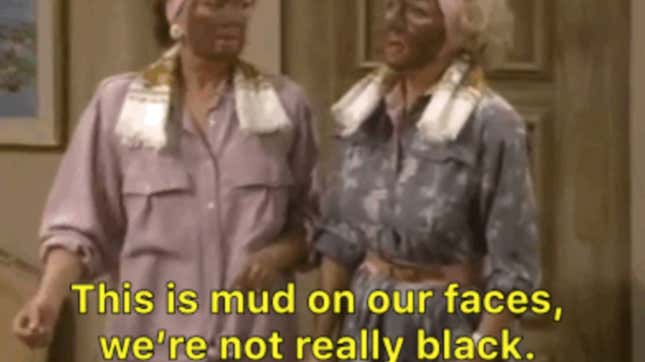
Hollywood is riding the woke train—without making any necessary stops along the journey to do the real work.
Earlier in the month, we mentioned the emptiness of symbolic gestures in the form of Black boxes.
Well, it seems like those black boxes are still continuing to cover up the bigger picture in yet other ways. It started when executive producers Tina Fey and Robert Carlock requested that several episodes of 30 Rock that contained blackface be pulled from archives. Shortly after, Kristen Bell and Jenny Slate decided to give up their respective roles in Central Park and Big Mouth in order to give roles to Black voice actors or voice actors of color.
Then, all of a sudden, I saw more news, including Mike Henry announcing he would no longer be playing the voice of Cleveland Brown from Family Guy and his subsequent titular spinoff series. Henry expressed a similar sentiment that cartoons of colors should be voiced by voice actors of color.
I started to wonder—wait, what is this bandwagon jumping happening here? Others who noticed the trend expressed cynicism, especially considering the fact that most of the benefits from the show (such as royalties) have already been collected and the damage has been done.
Then, things came to a head for me when it was announced that a 1988 episode from Golden Girls would be pulled, claiming that the episode contained blackface. The episode titled, “Mixed Blessings” follows Dorothy’s (Beatrice Arthur) son Michael (Scott Jacoby) who plans to marry a much older Black woman, Lorraine (Rosalind Cash). While Dorothy disapproves of the wide age gap, Lorraine’s family doesn’t approve of their daughter marrying a white man.
When Lorraine’s family arrives at the ladies’ home, Rose (Betty White) and Blanche (Rue McClanahan) inadvertently greet them while trying out a new mud face treatment, and the two jolted ladies automatically proceed with caution saying, “This is mud on our faces, we’re not really Black.”
To me, it was a satirical way of pointing out that blackface existed while acknowledging that this particular instance wasn’t it. However, it can be argued that the presumed message didn’t land due to the particular line they uttered. Regardless, the instinct to jump on this and remove it because it could possibly be blackface without actually assessing or addressing the context didn’t, as Cedric the Entertainer says, curl all the way over to me. In fact, Vulture currently has a whole ongoing list of blackface episodes and scenes being removed from the zeitgeist.
Then there was the $130 million bidding war for Emancipation, which reminded me of The Help, trending on Netflix when white folks rushed to find something that would give them an informative look on race relations. The timing was...interesting, to say the least.
To me, these empty efforts to implement quick fixes in order to solve a systemic plague in Hollywood weren’t necessarily made with the marginalized in mind, but to assuage guilt. Others brought up a good point in that it was used as a band-aid to the larger and pervasive problem of police brutality and systemic racism.
Not that I think Hollywood insiders can ultimately change societal structures—though they can use their elevated platform and privilege to contribute to the change in myriad ways, such as activism amplification, donations and lobbying for policies that benefit marginalized and oppressed groups (and not just themselves and their wealthy counterparts). And even if we were to hone this in on the issues within Hollywood itself—which would go in line with my beat—are we just going to throw a bunch of jobs at Black folks, but ignore the corporate gut rehab required to make sure these Black employees actually feel safe and respected in these jobs? Or will there be efforts to upend the structure originally designed to make sure marginalized voices are the least heard?
For example, even when we count the slowly growing number of Black writers in the proverbial room as “progress,” (the 2020 Writers Guild of America West Inclusion & Equity report confirmed a 5 percent growth in TV writing jobs for women and people of color) those writers aren’t able to progress in the same fashion as their white counterparts. The glass ceiling is very real.
“People in my position are either not selling shows or not moving up in the room,” Supervising producer for ABC’s For Life Kirk Moore recently told the LA Times last week, pointing out that his situation is an exception and not the rule. “If we are gonna talk about Black Lives Matter...then you actually have to let people of color run the room.”
Recently, the classic Hollywood story resurfaced with the recounting of how the industry took a risk on a highly inexperienced and unprepared writer named Lena Dunham and her one-page pitch for a show, Girls, which ended up being a hit. Classic Hollywood, right? Well, not so much for Black writers or other writers of color in the same position. Let’s look at what could be considered the Black woman equivalent of an HBO overall deal darling—Issa Rae. If you’ve been closely following Rae’s career since her word-of-mouth popular web series, The Misadventures of Awkward Black Girl, you’ll know the journey through development hell she endured just to get to the premiere of Insecure.
Those are just a few examples, but the overall message is clear: It’s not the things on the surface that can be magically erased away. It’s the whole system, even the people who are supposed to represent you and your interests.
The fix will be long, arduous, painful, challenging and many other adjectives in between, but what it won’t be is quick and easy. There is no amount of blackface erasing or retroactive affirmative action-based hiring that will change that. If you think so, you’re just putting a mud mask over the real issue as an avoidance tactic.

